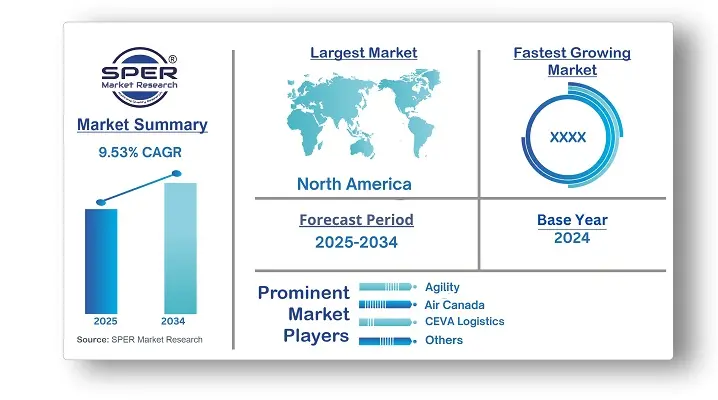Pharmaceutical Logistics Market Introduction and Overview
According to SPER Market Research, the Global Pharmaceutical Logistics Market is estimated to reach USD 250.89 billion by 2034 with a CAGR of 9.53%.
The report includes an in-depth analysis of the Global Pharmaceutical Logistics Market, including market size and trends, product mix, Applications, and supplier analysis. The pharmaceutical logistics market is expected to increase at a compound annual growth rate (CAGR) of 9.53% between 2025 and 2034, from its estimated USD 100.96 billion in 2024.The growing demand for pharmaceuticals is driving the need for transporting and storing medications. This means more medications are moving through the logistics network, requiring effective management. The rise of biologics, tailored medications, and temperature-sensitive vaccinations demands advanced logistical solutions.
By Type Insights
The cold chain logistics segment is expected to have a large market share by 2034 and grow significantly from 2025 to 2034 due to increased demand for temperature-controlled products. Stringent government regulations for maintaining proper temperatures for sensitive pharmaceutical items will further support this growth.
The use of telematics in cold chain logistics enhances efficiency, connectivity, and safety in transporting cargo. Many biological and medical products need a controlled temperature during manufacturing and distribution to keep their quality and effectiveness. Consequently, pharmaceutical companies are utilizing temperature-controlled transportation and cold storage systems. The non-cold chain segment is also expected to grow, driven by the rising demand for non-cold chain pharmaceutical products.
By Component Insights
The storage sector held the highest market share in 2024. The need for storage facilities to preserve and obtain the efficacy of pharmaceutical products after they are developed and then distributed to distributors and merchants via various channels has grown significantly due to the quickly rising demand for both branded and generic medications. Consumers' changing lifestyles and eating patterns are boosting the market for temperature-sensitive protein and nutritional supplements, which is likely to enhance demand for the storage sector throughout the forecast period.
Regional Insights
Europe held a significant market share in 2024 and is expected to grow quickly from 2025 to 2034. This strong market presence is due to the increase in pharmaceutical product trades in key countries like Germany, U. K, France, and Nordics. Demand for various pharma products, including OTC medicines, has also contributed to this growth.
The substantial economic growth in nations like China and India is predicted to make the Asia Pacific area the fastest-growing. The large population is expected to increase the need for over-the-counter drugs, which will benefit the pharmaceutical logistics industry there. In addition, the industry is shifting production and sales to developing nations in Asia and South America, which is causing these regions to grow faster.
Market Competitive Landscape
To stay competitive, major market players are focusing on innovation and expanding their product lines. Companies are investing in research and development (R&D) to enhance the performance and efficiency of their products, particularly in automation and artificial intelligence (AI). Partnerships are becoming more common, allowing businesses to share technology and market access. Some companies are working with digital firms to add advanced data analytics to their products. Additionally, businesses are prioritizing sustainability by using eco-friendly materials and production methods.
Recent Developments:
NX Netherlands got IATA CEIV Pharma certification for its warehouse near Amsterdam Airport Schiphol in January 2024, indicating that it meets the IATA's pharmaceutical handling standards.
Turkish Cargo presented novel pharmaceutical logistics solutions in January 2024, demonstrating its dedication to excellence in the handling of medicines and medical consignments. The company has an IATA CEIV Pharma certificate, which ensures the safe shipment of all pharmaceutical products.
Scope of the report:
| Report Metric | Details |
| Market size available for years | 2021-2034 |
| Base year considered | 2024 |
| Forecast period | 2025-2034 |
| Segments covered | By Type, By Component |
| Regions covered | North America, Latin America, Asia-Pacific, Europe, and Middle East & Africa |
| Companies Covered | Agility, Air Canada, CEVA Logistics, DB Schenker, Deutsche Post AG, FedEx, LifeConEx, Marken, United Parcel Service of America, Inc, VersaCold Logistics Services.
|
Key Topics Covered in the Report
- Global Pharmaceutical Logistics Market Size (FY’2021-FY’2034)
- Overview of Global Pharmaceutical Logistics Market
- Segmentation of Global Pharmaceutical Logistics Market By Type (Cold Chain Logistics, Non-cold Chain Logistics)
- Segmentation of Global Pharmaceutical Logistics Market By Component (Storage, Transportation, Monitoring Components)
- Statistical Snap of Global Pharmaceutical Logistics Market
- Expansion Analysis of Global Pharmaceutical Logistics Market
- Problems and Obstacles in Global Pharmaceutical Logistics Market
- Competitive Landscape in the Global Pharmaceutical Logistics Market
- Details on Current Investment in Global Pharmaceutical Logistics Market
- Competitive Analysis of Global Pharmaceutical Logistics Market
- Prominent Players in the Global Pharmaceutical Logistics Market
- SWOT Analysis of Global Pharmaceutical Logistics Market
- Global Pharmaceutical Logistics Market Future Outlook and Projections (FY’2025-FY’2034)
- Recommendations from Analyst
1. Introduction
1.1. Scope of the report
1.2. Market segment analysis
2. Research Methodology
2.1. Research data source
2.1.1. Secondary Data
2.1.2. Primary Data
2.1.3. SPER’s internal database
2.1.4. Premium insight from KOL’s
2.2. Market size estimation
2.2.1. Top-down and Bottom-up approach
2.3. Data triangulation
3. Executive Summary
4. Market Dynamics
4.1. Driver, Restraint, Opportunity and Challenges analysis
4.1.1. Drivers
4.1.2. Restraints
4.1.3.Opportunities
4.1.4. Challenges
5. Market variable and outlook
5.1. SWOT Analysis
5.1.1. Strengths
5.1.2. Weaknesses
5.1.3. Opportunities
5.1.4. Threats
5.2. PESTEL Analysis
5.2.1.Political Landscape
5.2.2.Economic Landscape
5.2.3.Social Landscape
5.2.4.Technological Landscape
5.2.5.Environmental Landscape
5.2.6.Legal Landscape
5.3. PORTER’s Five Forces
5.3.1.Bargaining power of suppliers
5.3.2.Bargaining power of buyers
5.3.3.Threat of Substitute
5.3.4.Threat of new entrant
5.3.5.Competitive rivalry
5.4. Heat Map Analysis
6. Competitive Landscape
6.1. Global Pharmaceutical Logistics Market Manufacturing Base Distribution, Sales Area, Product Type
6.2. Mergers & Acquisitions, Partnerships, Product Launch, and Collaboration in Global Pharmaceutical Logistics Market
7. Global Pharmaceutical Logistics Market, By Type (USD Million) 2021-2034
7.1. Cold Chain Logistics
7.2. Non-cold Chain Logistics
8. Global Pharmaceutical Logistics Market, By Component (USD Million) 2021-2034
8.1. Storage
8.1.1.Warehouse
8.1.2.Refrigerated Container
8.2. Transportation
8.2.1.Sea Freight Logistics
8.2.2.Airfreight Logistics
8.2.3.Overland Logistics
8.3. Monitoring Components
8.3.1.Hardware
8.3.1.Sensors
8.3.1.RFID Devices
8.3.1.Telematics
8.3.1.Networking Devices
8.3.2. Software
9. Global Pharmaceutical Logistics Market, (USD Million) 2021-2034
9.1. Global Pharmaceutical Logistics Market Size and Market Share
10. Global Pharmaceutical Logistics Market, By Region, (USD Million) 2021-2034
10.1.Asia-Pacific
10.1.1.Australia
10.1.2.China
10.1.3.India
10.1.4.Japan
10.1.5.South Korea
10.1.6.Rest of Asia-Pacific
10.2.Europe
10.2.1.France
10.2.2.Germany
10.2.3.Italy
10.2.4.Spain
10.2.5.United Kingdom
10.2.6.Rest of Europe
10.3.Middle East and Africa
10.3.1.Kingdom of Saudi Arabia
10.3.2.United Arab Emirates
10.3.3.Qatar
10.3.4.South Africa
10.3.5.Egypt
10.3.6.Morocco
10.3.7.Nigeria
10.3.8.Rest of Middle-East and Africa
10.4.North America
10.4.1.Canada
10.4.2.Mexico
10.4.3.United States
10.5.Latin America
10.5.1.Argentina
10.5.2.Brazil
10.5.3.Rest of Latin America
11. Company Profile
11.1.Agility
11.1.1.Company details
11.1.2.Financial outlook
11.1.3.Product summary
11.1.4.Recent developments
11.2.Air Canada
11.2.1.Company details
11.2.2.Financial outlook
11.2.3.Product summary
11.2.4.Recent developments
11.3.CEVA Logistics
11.3.1.Company details
11.3.2.Financial outlook
11.3.3.Product summary
11.3.4.Recent developments
11.4.DB Schenker
11.4.1.Company details
11.4.2.Financial outlook
11.4.3.Product summary
11.4.4.Recent developments
11.5.Deutsche Post AG
11.5.1.Company details
11.5.2.Financial outlook
11.5.3.Product summary
11.5.4.Recent developments
11.6.FedEx
11.6.1.Company details
11.6.2.Financial outlook
11.6.3.Product summary
11.6.4.Recent developments
11.7.LifeConEx
11.7.1.Company details
11.7.2.Financial outlook
11.7.3.Product summary
11.7.4.Recent developments
11.8.Marken
11.8.1. Company details
11.8.2. Financial outlook
11.8.3. Product summary
11.8.4. Recent developments
11.9.United Parcel Service of America, Inc
11.9.1.Company details
11.9.2.Financial outlook
11.9.3.Product summary
11.9.4.Recent developments
11.10.VersaCold Logistics Services
11.10.1.Company details
11.10.2.Financial outlook
11.10.3.Product summary
11.10.4.Recent developments
11.11.Others
12. Conclusion
13. List of Abbreviations
14. Reference Links
SPER Market Research’s methodology uses great emphasis on primary research to ensure that the market intelligence insights are up to date, reliable and accurate. Primary interviews are done with players involved in each phase of a supply chain to analyze the market forecasting. The secondary research method is used to help you fully understand how the future markets and the spending patterns look likes.
The report is based on in-depth qualitative and quantitative analysis of the Product Market. The quantitative analysis involves the application of various projection and sampling techniques. The qualitative analysis involves primary interviews, surveys, and vendor briefings. The data gathered as a result of these processes are validated through experts opinion. Our research methodology entails an ideal mixture of primary and secondary initiatives.





































